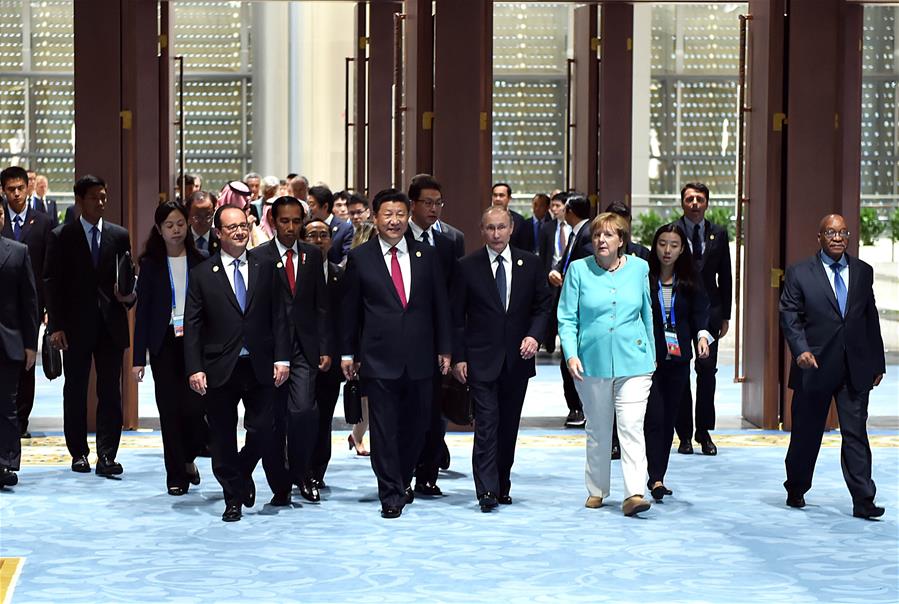
Chinese President Xi Jinping and other leaders of the Group of 20 (G20) members, some guest countries and international organizations walk into the venue of the G20 summit in Hangzhou, capital of east China's Zhejiang Province, Sept. 4, 2016. (Xinhua/Li Tao)
HANGZHOU, Sept. 4 (Xinhua) -- Political and business leaders from across the world rang the alarm here over the weekend against a broad resurgence of trade protectionism, calling for concerted efforts to boost global trade.
In a speech delivered Sunday at the opening session of the 11th summit of the Group of 20 (G20) major economies, Chinese President Xi Jinping urged G20 members to build an open global economy and continue to promote facilitation and liberalization of trade and investment.
"Protectionism is like drinking poison to quench one's thirst," Xi said, "The G20 should resolutely oppose the beggar-thy-neighbor policy, and advocate and promote the building of an open global economy."
Prior to the G20 leaders' meeting, which is themed "Toward an Innovative, Invigorated, Interconnected and Inclusive World Economy," national leaders and international organization chiefs also issued warnings at a business summit against the undercurrent of a worldwide anti-trade movement.
During a Sunday session of what is known as the Business 20 (B20) Summit, Australian Prime Minister Malcolm Turnbull pointed to the rise of populist calls in many nations for protectionist measures, acknowledging that restoring public trust in trade is "a very significant political challenge for us all."
"That is a road we cannot afford to go down. It would be a mistake of historic proportions for the G20 to stand by while scare campaigns not based on facts or evidence fostered protectionism or, indeed, isolationism," he said.
The Australian prime minister called on business and political leaders alike to do more to contribute to constructive public dialogue on key issues such as trade and investment in order to rebuild this trust.
Turnbull's Canadian counterpart, Justin Trudeau, said at a Saturday session that "there's a sense the forward march of progress has stalled" and the anxiety has led to "anti-trade, anti-globalization protectionism that is running rampant."
"We have to push back against that," he said, "It's very tempting to fall into divisive, fearful rhetoric. That's one of the things we have to be strongly compelling in standing against."
Roberto Azevedo, director-general of the World Trade Organization (WTO), said that anti-trade rhetoric could lead to erroneous policies and the business community should speak up more against it.
Stressing that trade accounts for only less than 20 percent of unemployment, Azevedo pointed out that "going against trade is effectively going against growth and your economy."
Meanwhile, the WTO chief called for better distribution of the benefits of trade, and emphasized the need to increase participation in trade by small- and medium-sized enterprises (SMEs), which account for the largest share of the workforce.
WTO statistics showed that global trade growth has slowed significantly since 2008, from an average of over 7 percent each year between 1990 and 2008 to less than 3 percent between 2009 and 2015. The last year marked the fourth consecutive year with a global trade growth rate below 3 percent.
For her part, International Monetary Fund (IMF) Managing Director Christine Lagarde made a "vibrant call" to the business community to raise their voice and boost international trade.
"Trade is way too low and has been way too low for a long time," Lagarde said, urging B20 leaders to push for changes.
"If there is no international trade, if there is no cross-border investment, if services, capital, people and goods do not cross borders, then it's less activity for you, it's less jobs in whichever countries you headquartered," she said.




